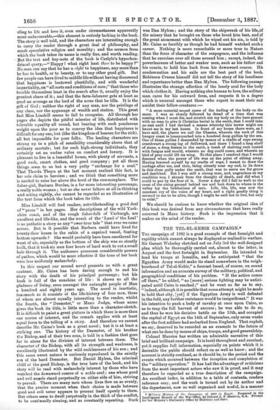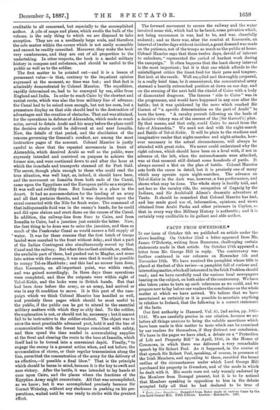THE TEL-EL-KEBIR CAMPAIGN.* THE campaign of 1882 is a good
example of that foresight and rapidity which cannot always be displayed or realised-in warfare. Sir Garnet Wolseley sketched out on July 3rd the well-designed plan which he thoroughly carried out, almost to the letter, in August and the first fortnight in September. He intended to land his troops at Ismailia, and he anticipated "that the Egyptian Army would make its stand somewhere in the neigh- bourhood of Tel-el-Kebir," a forecast based, of course, on sound information and an accurate survey of the military, political, and geographical conditions of his problem. "If the action comes off there," he added, "no [more] serious fighting may be antici- pated until Cairo is reached ;" and he went so far as to say, "indeed, although it is possible that some attempt might be made to hold that city, [yet] if the Egyptian Army is well defeated in the field, any further resistance would be insignificant." It was his intention to push a body of cavalry at once upon Cairo, so as to reap the fall harvest of success; he was able to do so, and thus he won his decisive battle on the 13th, and occupied the capital of Egypt on the 14th of September, only seven weeks after the first soldiers had embarked from England. That exploit, we say, deserved to be recorded as an example to the future of what can be done by means of ships, troops, and good generalship.
Colonel Maurice has written an admirable narrative of this brief and brilliant campaign. It is lucid throughout and succinct, yet it supplies full information, especially on points which it is desirable the public should reflect on as well as know ; and the account is strictly confined, as it should be, to the period and the events which occurred between the inception and completion of the "military operation." It has had the advantage of criticisms from the most important actors who saw it in proof, and it may therefore be regarded as a true description of the campaign. An excellent index, in addition to a table of contents, renders reference easy, and the work is turned out by its author and the department, now so well organised and useful, in a manner
• Military History of the Campaign of Mt in Egypt. Prepared in the Intelligence Branch of the War Office. by Colonel J. F. Maurice, R.A, Printed for her Hajeety's Stationery Office by Harrison and SOUL
creditable to all concerned, but especially to the accomplished author. A pile of maps and plans, which swells the bulk of the volume, is the only thing to which we are disposed to take exception. They are on a needlessly large scale, and therefore the sole matter within the covers which is not easily accessible and cannot be readily consulted. Moreover, they snake the book very cumbersome, and they are out of all proportion to the undertaking. In other respects, the book is a model military history in compass and substance, and should be useful to the public as well as to the soldier.
The first matter to be pointed out—and it is a lesson of permanent value—is that, contrary to the impatient opinion expressed at the moment, no time was lost ; and that fact is admirably demonstrated by Colonel Maurice. The expedition, rapidly determined on, had to be conveyed by sea, alike from England and India. In order to reach Cairo by the shortest and easiest route, which was also the true military line of advance, the Canal had to be seized soon enough, but not too soon, lest a premature display on that side should lead to the destruction of advantages and the creation of obstacles. That end was attained, for the operations in defence of Alexandria, which made so much noise, served to detain Arabi and his army before the place until the decisive stroke could be delivered at and near Ismailia. Now, the details of that period, and the elucidation of the reasons governing the General's conduct, are among the most instructive pages of the account, Colonel Maurice is justly careful to show that the repeated movements in front of Alexandria, which deceived Arabi as well as the public, were expressly intended and contrived on purpose to achieve the former aim, and were continued down to and after the hour at which the ironclads and transports steamed off for Port Said. The secret, though plain enough to those who could read the true situation, was well kept, as, indeed, it should have been, and the movement on Ismailia from both ends of the Canal, came upon the Egyptians and the European public as a surprise. It was well and swiftly done. Bat Ismailia is a place in the desert. It had no accommodation for the landing of an army and all that pertains thereto, and it was dependent upon the canal connected with the Nile for fresh water. The command of that indispensable fluid was in the enemy's hands, for he could and did open sluices and erect dams on the course of the Canal. In addition, the railway-line from Suez to Cairo, and from Ismailia to Cairo, had a junction just outside the latter. Now, the first thing to be done was to seize the junction, and then so much of the Freshwater Canal as would ensure a full supply of *water. It was for these reasons that the first batch of troops landed were marched to the front without delay, and that a part of the Indian Contingent also simultaneously moved up that Canal and the railway. But when the earliest arrivals, or, rather, the available part of them, had pushed out to Magfar, and come into action with the enemy, it was seen that it would be possible to occupy Teles-Maskhuta ; and this had no sooner been done, than Kassassin, an all-important point, was within reach, and was gained accordingly. In three days these operations were completed, and thus the outposts were within sight of Tel-el-Kebir, and the locks were in British hands. But that had been done before the army, as an army, had arrived or was in any fit condition to move. It is this part of the cam- paign which we think Colonel Maurice has handled so well, and precisely these pages which should be most useful to the public, if the public can be got to attend to the essential military matters with which they so ably deal. To the soldier, the explanation is not, or should not be, necessary ; but it cannot fail to be instructive to the soldier-student. The object was to seize the most practicable advanced post, hold it and the line of communication with the fewest troops consistent with safety, and than spend the time needed in accumulating supplies at the front and clearing the route to the base at Ismailia, which itself had to be tnrned into a convenient depot. Finally, "to engage the enemy in a general action when, and not before, the accumulation of stores, or their regular transmission along the line, permitted the concentration of the army for the delivery of an effective,—if possible a final blow." That is the principle which should be borne in mind, because it is the key to swift and sure victory. After the battle, it was intended to lay hands at once upon Cairo, and the places where the fractions of the Egyptian Army might concentrate. All that was accomplished, as we know; but it was accomplished precisely because Sir Garnet Wolseley, without any Blackness in pushing on his pre- parations, waited until he was ready to strike with the greatest effect. The forward movement to secure the railway and the water involved some risk, which had to be faced, some privation which, not being uncommon in war, had to be, and was, cheerfully endured ; and as there was, after the combat at Kassassin, an interval of twelve days without incident, a great demand was made on the patience, not of the troops so much as the public at home. Colonel Maurice says that these twelve days, devoid of interest to onlookers, "represented the period of hardest work during the campaign." It often happens that the least showy interval is the most important ; but it is that one which affords to the unintelligent critics the finest food for their pens and tongues. But look at the result. Well supplied and thoroughly prepared, in a really brief time, be it remembered, the concentrated army stormed a heavily entrenched position at dawn on one day, and on the evening of the next held the citadel of Cairo with a body of dismounted dragoons. The famous ride to Cairo" was in the programme, and would have happened in any case after the battle ; but it was quickened by the news which reached Sir Garnet of "a specific determination on the part of Arabi" to burn the town. "A cavalry pursuit following on the heels of a decisive victory was of the essence of the [Sir Garnet's] plan. By that means, and that only, could Cairo be saved from the fate of Alexandria." We need not deal with the night-march and Battle of Tel-el-Kebir. It will be plain to the studious and imaginative reader that night-marches and night-attacks, how. ever necessary in the actual circumstances, will always be attended with great risks. We never could understand why the right column, which should have been on a level with, if not in advance of, the left, when the entrenchments were attacked, was at that moment still distant some hundreds of yards. It always seemed a blot on the plan of battle. Colonel Maurice sets forth the cause in detail, but it is precisely one of many which may operate upon night-marches. The advance on Telel-Kebir in the dark was, however, a fine performance, and shows what may be done. The whole story is lucidly told, and not less so the cavalry ride, the occupation of Zagazig by the Indians, and Sir Archibald .Alison's dramatic adventure at Tanta. It should be remarked that Colonel Maurice has had, and has made good use of, information. opinions, and views obtained from Arabi Pasha and other prisoners in Ceylon, so that in every way this Military History is authentic ; and it is certainly very creditable to its gallant and able author.










































 Previous page
Previous page